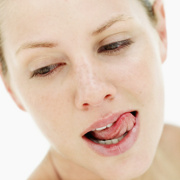 Photo: Getty Images
Photo: Getty Images
It happens every winter. The air is cold and dry and so are our lips. Licking our lips helps them feel moister, but only in the beginning. Soon, habitual lip licking leads to more dryness, cracking and redness. Lip lickers dermatitis is more common in kids but can occur in adults. Read on to hear about treatments to help replenish and repair dry lips in general.
Lip lickers dermatitis is a form of irritant contact dermatitis. It is caused when chemicals in our saliva come in contact with our lips and surrounding skin. The constant moisture from continued licking aggravates the damaged skin and a tender reddened rash appears. Lip lickers dermatitis is not the same as perioral dermatitis (see my article at www.empowher.com/skin-hair-amp-nails/content/perioral-dermatitis-pd), which is can be triggered by use of moisturizers, cosmetics and over use of steroid creams.
The first line of treatment for lip lickers dermatitis is to moisturize with a cream or balm formulated for the lips. Use a non-medicated type of lip balm and carry it with you so you may use it after eating or drinking. Choose a lip balm with sunscreen if you will be outdoors to prevent further damage from the sun. The key is to use it often enough to replenish lip moisture without over doing it allowing your lips to still produce natural lubricant on their own.
Using petroleum jelly is another way to create a moisture barrier around your mouth. Even wearing lipstick regularly will help moisturize the lips and lipstick may filter out some UV light rays. Beeswax is another topical barrier that can be tried and can be bought in jar form (e.g. Carmex), a lip balm such a Burt’s or if you search the internet you can find a recipe to make your own.
Sometimes, lip lickers dermatitis may need a little protection from an over the counter topical anti-bacterial such as Bacitracin or Neosporin. You can apply it once a day and then continue with some other barrier lip balm for the rest of the day.
Drinking more water is important to not only moisturize your lips but to keep your body well hydrated, particularly in winter when the air is overly dry. Set up a humidifier in your office and bedroom to help increase moisture in the surrounding air you breathe.
Lastly, avoid using toothpastes that contain irritating substances such as flavorings or even tartar protection, which might aggravate lip lickers dermatitis. Only brush your teeth with non-additive types of toothpastes or try using just baking soda. Do not use mouthwashes, eat candy or chew gum until the lip lickers dermatitis has cleared.
Hopefully this winter with some preventive practices, lip lickers dermatitis can be avoided and your lips will be moist and ready for the next season.
sources:
www.mothernature.com/Library/Bookshelf/Books/47/31.cfm
www.pedsforparents.com/articles/2868.shtml
Michele is an R.N. freelance writer with a special interest in woman’s healthcare and quality of care issues. Other articles by Michele are at www.helium.com/users/487540/show_articles





Add a CommentComments
There are no comments yet. Be the first one and get the conversation started!